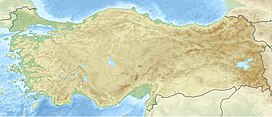Aras Mountains
| Aras Mountains | |
|---|---|
 One of the highest points in the Aras mountains; Mount Aşağı. | |
| Highest point | |
| Elevation | 3,275 m (10,745 ft) |
| Prominence | 3,196 m (10,486 ft) |
| Coordinates | 40°01′34″N 43°12′01″E / 40.02599°N 43.20021°E |
| Geography | |
| Location | Erzurum Province, Kars Province, Ağrı Province, Iğdır Province, Turkey |
Aras Mountains (Turkish: Aras Dağları, Armenian: Հայկական Պար), is a mountain range in northeastern Turkey. Also known as Haykakan Par. It is located on the border of Erzurum, Kars, Ağrı and Iğdır provinces.
History
[edit]The Aras Mountains formed the borders of the Kingdom of Erikua and Urartu in ancient times. The crossings above it, on the other hand, have been the most important defense points where the borders of the two countries are protected.[1]
Geology and geomorphology
[edit]The Aras Mountains start from the Erzurum border, pass the Ağrı and Kars borders, and end in the west of Mount Ararat. This mountain range, extending from west to east, divides the geography it passes through into two in the north-south direction. The most important elevations of the mountains are Zor and Pamuk mountains. Doğubayazıt district center is located in the south of the Karasu-Aras Mountains, Iğdır is in the north. Lale Balık is located in the Aras Mountains.[2] Doğubayazıt Reeds are located to the east of Zor Dağ, which is part of the Aras Mountains.[3]
References
[edit]- ^ "Tarihi Coğrafya Işığında Ağrı Dağı Bölgesindeki Geçitler" (PDF) (in Turkish). Iğdır University. October 26, 2022. p. 22.
- ^ "Karasu-Aras Dağları'nın güney yamaçlarında Doğubeyazıt bölgesi erken demir çağı yerleşmeleri" (in Turkish). Barış Gür- Amisos. February 26, 2022. p. 1.
- ^ "Doğubayazıt sazlığının (Ağrı-Türkiye) arazi örtüsü deseninde meydana gelen değişimlerin ekolojik sonuçları üzerine bir analiz" (in Turkish). Doğu Coğrafya Dergisi-Atatürk University. December 20, 2021. p. 3.

